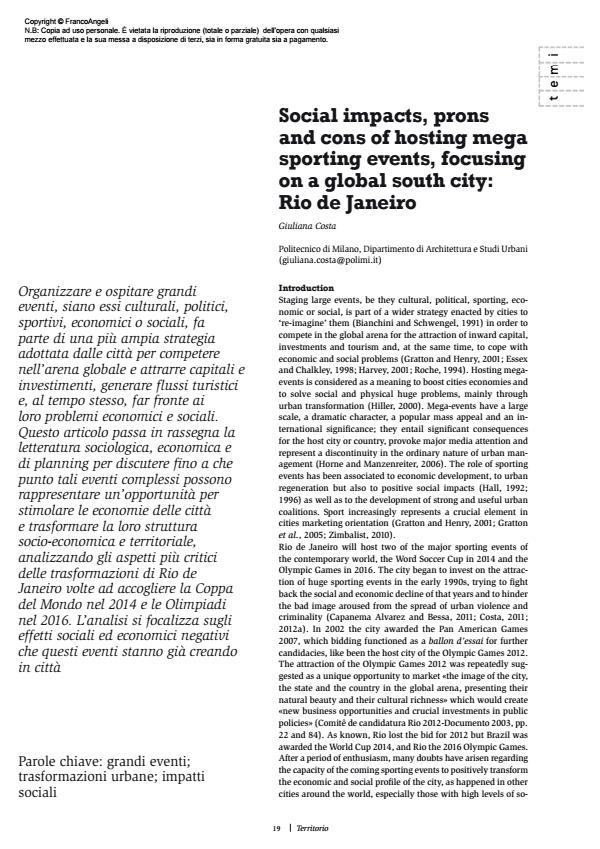Social impacts, prons and cons of hosting mega sporting events, focusing on a global south city: Rio de Janeiro
Journal title TERRITORIO
Author/s Giuliana Costa
Publishing Year 2013 Issue 2013/64
Language English Pages 9 P. 19-27 File size 392 KB
DOI 10.3280/TR2013-064004
DOI is like a bar code for intellectual property: to have more infomation
click here
Below, you can see the article first page
If you want to buy this article in PDF format, you can do it, following the instructions to buy download credits

FrancoAngeli is member of Publishers International Linking Association, Inc (PILA), a not-for-profit association which run the CrossRef service enabling links to and from online scholarly content.
The organisation and hosting of major events, whether cultural, political, sports, economic or social, forms part of a broader strategy adopted by cities to compete in the global arena and to attract capital and investments and to boost tourism and at the same time to address their economic and social problems. This paper reviews the sociological, economic and planning literature in order to discuss to what extent these complex events represent an opportunity to stimulate the economies of cities and to transform their socio-economic and geographical structure. It does this by analysing the most critical aspects of the changes and redevelopment carried out in Rio de Janeiro to host the 2014 World Cup and the 2016 Olympics. The analysis focuses on the negative social and economic effects which these events are already having on the city.
Keywords: Great events; urban transformations; social impacts
- The Rio Olympic Games: A Look into City Dynamics through the Lens of Twitter Data Ana Condeço-Melhorado, Inmaculada Mohino, Borja Moya-Gómez, Juan Carlos García-Palomares, in Sustainability /2020 pp.7003
DOI: 10.3390/su12177003 - Destruction or construction? A (counter) branding analysis of sport mega-events in Rio de Janeiro Antonella Maiello, Cecilia Pasquinelli, in Cities /2015 pp.116
DOI: 10.1016/j.cities.2015.06.011
Giuliana Costa, Social impacts, prons and cons of hosting mega sporting events, focusing on a global south city: Rio de Janeiro in "TERRITORIO" 64/2013, pp 19-27, DOI: 10.3280/TR2013-064004